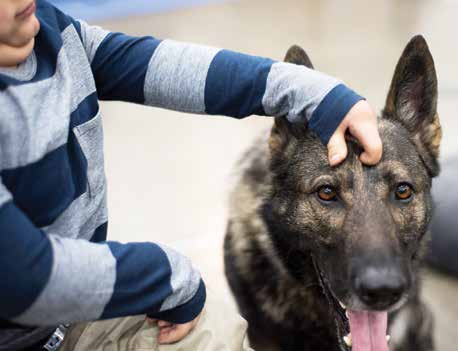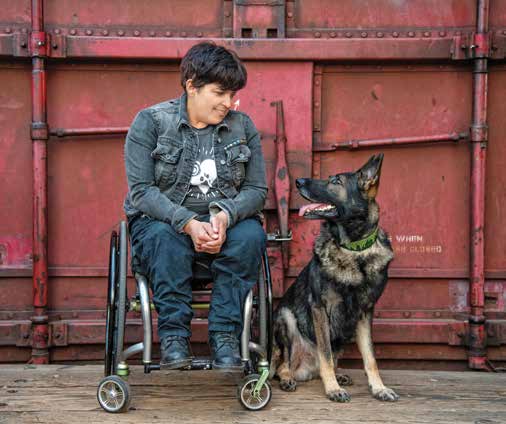Imagine scraping, scrimping, and saving all your hard-earned dollars to realize a long-held dream – the purchase of a well-trained service dog for yourself, a family member, or a friend. You’ve spent long hours imagining how life will be so much easier for you and your loved-ones with a trusted canine assistant there to help. Finally, the long-awaited day is here, and your service dog arrives.
Now imagine your disappointment and horror when you realize the dog you just paid thousands of dollars for is untrained, undersocialized, fearful, and even aggressive. Your dream just turned into a nightmare. You have been scammed.
A growing number of news stories are reporting cases of dog training companies allegedly selling completely untrained dogs as service dogs. The Ry-Con Service Dog Company in Raleigh, North Carolina, closed its doors in January of this year after more than 40 customers filed complaints with that state’s Attorney General. Prices for those dogs ranged from $10,000 to $15,000, and complaints included dogs who weren’t housetrained, and on at least one occasion, a dog who bit the child he was supposed to be serving.
Virginia’s Attorney General filed a lawsuit in May 2018 against Roanoke-based Service Dogs by Warren Retrievers, alleging the dogs they sold for $18,000 to $27,000 were sometimes as young as three months and weren’t even trained to respond to basic cues, much less perform the diabetes-alert tasks they were sold to do. The State received complaints from more than 50 Warren Retriever customers.

It’s truly one of the more heartless scams being perpetuated these days, and it’s happening with increasing frequency, due in part to the large sums of money people are willing to pay for service dogs, and in part to the complete lack of regulation in the dog training industry.
Evolution of a Scam
When properly trained, dogs can immensely improve the quality of life for people who need them. Many years ago, the only service dogs were guide dogs for vision-impaired humans. Only a few companies provided the very highly specialized training dogs needed for this task, and scams were nonexistent. A poorly trained guide dog could easily get her person killed.
Next on the scene were hearing dogs for people who had varying degrees of hearing impairment. Because hearing dog tasks were (and are) simpler to train than guide dogs, this option attracted multiple training professionals to the service dog field. The San Francisco SPCA was a leader in this new development and soon others jumped in.
Eventually, people realized that service dogs could be capable of performing a much wider variety of tasks, and the service dog boom was born. Today, dogs perform a limitless list of behaviors for their differently abled humans, including opening and closing doors; helping their people get dressed; detecting allergens, low blood sugar levels and the impending onset of seizures; picking up dropped items; turning appliances on and off; providing physical support; calling for emergency help; and much more.
Their incredible versatility and value has created a huge demand for service dogs and a well-trained dog can command a high price.
Add in the fact that our society has become accustomed to ordering anything we want from the internet; more and more people today purchase puppies and adopt dogs sight unseen from across the country.

This combination created a perfect storm that explains the success of service-dog scammers who ship untrained dogs great distances, sight unseen, to disabled clients. Who would be so cruel as to defraud a person with a disability? Apparently, there are all too many who are willing to do so.
Lack of Regulation
Another contributor to the problem is the fact that the dog training industry as a whole, not just the service-dog training industry, is woefully unregulated. In most if not all parts of the United States, literally anyone can hang out a sign or put an ad in the paper and call themselves a dog trainer – even a service-dog trainer. Someone who is willing to be unethical about acquiring the background and training necessary to be a competent training professional may also be more likely to be willing to rip people off for an untrained service dog.
Tips for Avoiding Service Dog Scammers
Many people have a very real need for the assistance and independence that a real service dog can provide. It’s a travesty that those who could really benefit from a well-trained dog might be afraid to try to acquire one because of the risk of being scammed – or, worse, might actually be defrauded when they do purchase a dog. If you know someone considering a service dog, please share these tips to help him or her avoid the scammers:
1. Check out the trainer and/or company. Ask training professionals you know and trust if they are familiar with the person or company with dogs for sale. If they aren’t familiar with the prospective seller, ask if they will help you find other reputable trainers who are familiar with the prospective seller.
Anyone who trains service dogs for sale should have, at a minimum, valid professional credentials from reputable trainer organizations, such as the Certification Counsel for Professional Dog Trainers, the Pet Professional Guild, or the International Association of Animal Behavior Consultants. There are other credentials that can support or boost a professional’s credibility, but these are a start. Veterinary Behaviorists or Certified Applied Animal Behaviorists have advanced degrees, which should be very easy to verify, but don’t take anyone’s word about any credentials! Contact the certifying organization and make sure the person’s credentials are in good standing.
2. Ask for a lot of references – 10, if not more. A trainer or company is unlikely to give you references to dissatisfied clients, but asking for a significant number decreases the likelihood that the references are fake. Contact the clients, and ask very specific questions about their dogs: age, breed, gender, how long they’ve had them, specifically what tasks the dogs were trained to do, and if the client is happy with the dog’s performance. Make the conversation light and chatty, not an interrogation!
After getting answers to the questions, ask if the client would be willing to send you videos of their dog performing some of the tasks. Many service dog owners are proud of their dogs and would be happy to show off their dogs’ accomplishments. When you receive the videos, make sure the dogs and the tasks match the descriptions given in the answers to your questions.
3. Meet your prospective service dog in person. I can’t even imagine adopting a dog sight unseen as a regular companion, much less one who will fill the critically important role of a service dog. I realize there may be a cost and significant inconvenience involved in traveling to wherever the dog is, but this is mandatory.
You need to see that the dog genuinely is trained, and the trainer should ensure that you and the dog are a good match. He or she should spend some time teaching you how to work with the dog. You also need to know you are comfortable with the dog!
4. Do a background check. Many states permit online criminal records searches. Something from someone’s far distant past might not be cause for alarm, but something more recent might be. Check with the Better Business Bureau to see if complaints have been filed. Ask the local Animal Control in the jurisdiction of the business if they have had any problems with the facility or its staff. Check to see if they have a business license. Do several online searches of the business name and look for articles and reviews about the business or its owners.
5. Consider setting up an escrow account. You might want an animal law attorney to help you with this one. An escrow is a contractual arrangement in which a third party receives and disburses money or property for the primary transacting parties. The disbursement is dependent on conditions agreed to and well-described in the contract by the transacting parties.
The conditions could include a period of time during which the dog demonstrates her ability to perform the tasks as promised by the trainer, and well as providing a guarantee of payment to the trainer when conditions are met.
6. Consider training your own service dog. No law says you have to buy a trained service dog, and a growing number of training professionals are helping owners train their own service dogs, especially for some of the less-demanding tasks.
Service Dog Coaching: A Guide for Pet Dog Trainers is a good and recently published book by Veronica Sanchez, CPDT-KA, CABC, that is helping trainers meet the needs of people seeking to train their own dogs. There are a variety of other books on the market intended to help you train your own service dog. Check with your trusted training professional about which of these books might be acceptable/suitable for you.
One important caveat: Your dog may or may not be suited for the work of a service dog – be prepared for this!
7. Trust your instincts. If any part of the service-dog training or service-dog purchase process feels wrong to you, trust your instincts! Whether it’s a bad feeling about the individual trainer, alarming information that turns up during the background check, or your own feelings about the dog you are being matched with – trust your instincts! Trying to recover your $10,000 to $25,000 from a scammer after the fact may be a very difficult challenge – if not an impossible one.
Your service dog should be an invaluable asset, a treasure, a life-enhancer, a comfort, and a joy. Do everything within your power to make sure she can be everything you want and need her to be.






